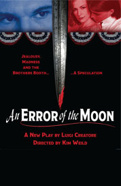Playwright Luigi Creatore Goes Over The Moon For History
About the author:
Luigi Creatore has made his mark on pop culture (and weddings) across the world by writing the classic Elvis ballad, “Can’t Help Falling in Love,” but the songwriter has always felt most at home in the theater. He composed the scores for 1968’s Maggie Flynn and 1973’s Smile, Smile, Smile and is the author of the 2008 off-Broadway comedy Flamingo Court. At age 88, Creatore is still going strong with his newest play, An Error of the Moon, now at the Beckett Theatre at Theatre Row. Moon tells a fictionalized account of the infamous assassin John Wilkes Booth and his actor brother Edwin. Creatore first examined the more notorious Booth brother with 1989’s The Man Who Shot Lincoln, but his fascination with the siblings continued, leading him back to the New York stage. Broadway.com asked Creatore to discuss the allure of the Booths and why, even at his age, he still loves heading to work each day.
![]()
I’ve been a writer all my life. I’ve written stories, novels, shows, plays and songs. The only thing I made money from were the megahit songs “Can’t Help Falling in Love” and “The Lion Sleeps Tonight,” but the theater is what I love. I was brought up in New York, and as a kid I used to sneak into the theater. I knew every second act on Broadway because I’d go back in with the audience after intermission. I’d have to make up the first act, and that’s where I began writing.
The show I’m doing now is called An Error of the Moon. It deals with Edwin Booth, who was a great Shakespearean actor in the 19th century, and his brother John Wilkes Booth, also an actor but better known as the man who assassinated Abraham Lincoln. Years ago I wrote a musical [1968’s Maggie Flynn] starring Shirley Jones about the Civil War and the riots against the draft in New York. That got me into researching the Civil War, and since then I’ve remained interested in it. While doing research, I ran across stories about the brothers Booth. They were both actors, so I wondered, “What is their relationship?”
On the surface, it seems that Edwin and John Wilkes Booth had a superficial relationship, if any. Edwin and his people always said he and John Wilkes were not close, and Edwin distanced himself, but looking into it, I don’t think there was that much distance. It was documented that they had conversations about the war and about John Wilkes going back and forth as a spy—he used to bring medicine across the lines with his actor’s pass. I had kept this brotherly dynamic in the back of my mind. Then, years later, I took it out and started playing with it.
In 1989, I wrote an off-Broadway play called The Man Who Shot Lincoln. It became a little too much like a history lesson—I put too many facts in it—but I continued playing with it for years, turning and changing things. Eventually I decided on a new take on the whole story of the Booths, which became my new play, An Error of the Moon. This time, I took the basic information and put a fictional plotline into it.
With history as a background, a story of mistaken jealousy comes forward. These characters were there in history, but nobody really knew their feelings so I went after the idea of what a sibling relationship between two actors might really be like. It’s more of a love story and about how men can go mad with jealousy. The “error of the moon” is a line from Shakespeare: “It is the very error of the moon, she comes more nearer earth than she was wont, and drives men mad.” And this is the story of how that happens.
Edwin and John were Shakespearean actors, and if you know any Shakespearean actors today, they will quote the Bard at the drop of their hat. So I have the characters doing that a lot, but there’s also a great fencing scene, because that’s what they did back then! Today brothers get together and they may shoot basketball, but then they used to fence. There was no basketball, after all!
As we prepare to open An Error of the Moon at the intimate Beckett Theatre, I’ve been at every rehearsal. Our director, Kim Weild, is so imaginative and ahead of the times. Here you have this historical drama and she’s bringing it up to modern times! She makes it a fresh, wonderful experience. We have a great cast of young actors who can do Shakespearean style performance terrifically well. It’s fun to have actors playing actors. Serious theatergoers are really going to enjoy this. Look for me in the back row in the last seat. I’ll be sitting there every night.
